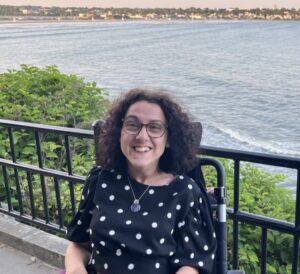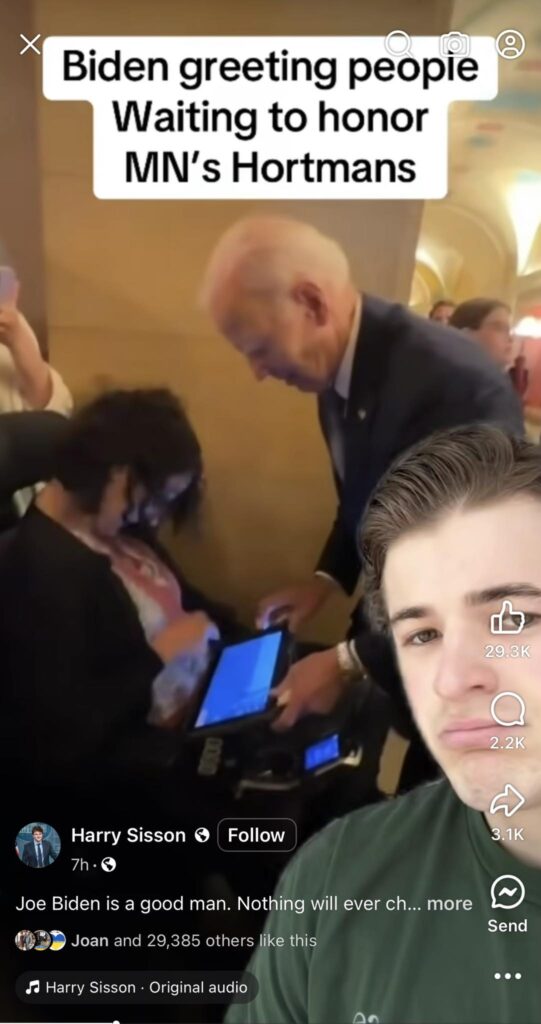
Image description: A woman with curly brown hair and glasses smiles at the camera while seated in her wheelchair.
“President Biden has a heart of gold for making time for this disabled woman.”
“Our current president would never let himself be seen next to someone like her.”
“She is using her AAC device to talk to the President! This is every speech therapist’s dream.”
“There is still hope left for humanity.”
These comments recently flooded my social media pages after a private video of my unexpected interaction with former President Joe Biden on Friday, June 27 was circulated online two days later without my consent. Before this moment, I had joined my local community at the Minnesota State Capitol to pay respects to State Representative Melissa Hortman and her husband Mark Hortman, who were tragically killed in a senseless act of political violence. I ran into President Biden by chance while looking for the elevator to leave the Capitol building. Biden leaned over my wheelchair to visibly interact with me. We spoke briefly, and I barely had time to collect my thoughts or process what was happening. Our interaction was over within minutes. When I got home, I told close friends and family about this random encounter, never intending for the story to spread beyond my inner circle.
Yet as a physically disabled woman next to one of the most famous public figures in the world, my presence quickly became sensational clickbait.

Image description: A still image from a social media video. President Joe Biden is shown bending down to greet a young woman in a wheelchair inside the Minnesota Capitol building. Text overlayed on the image states “Biden greeting people waiting to honor MN’s Hortmans.” You can see comments and lots of social media engagement at the bottom; the post was liked by almost 30,000 people.
The video of my meeting with Biden received ten of thousands of shares on TikTok, YouTube, and Meta platforms. Political commentators and online influencers reposted it as a “feel-good” story. They held it up as proof of the kindness and generosity that they see missing from modern politics. As the video gained traction, Biden was praised as saintlike, simply for talking to a disabled person. I became a one-dimensional inspiration in a story that people were determined to tell. My role in this story was to be the passive recipient of Biden’s “charitable” deed.
While inspirational headlines about me spread online, the House of Representatives passed a major domestic policy bill on July 3rd that threatens the livelihoods of people in my community.
The bill is projected to cut $1.02 trillion from Medicaid and Children’s Health Insurance Program (CHIP) benefits by 2034. More than 1 in 3 people with disabilities (15 million people) rely on Medicaid for life-sustaining healthcare and long-term care. At least 10.5 million Medicaid recipients may be disenrolled by 2034, due to new limits on eligibility and work requirements.
Cuts to Medicaid funding will impact disability community members like me. I rely on state-funded Medicaid programs to pay my team of personnel care attendants (PCAs), who help with activities of daily living, so that I can live independently at home. With consistent PCA support, I have maintained meaningful work, traveled around the world, and built a vibrant social life. Medicaid programs prevent people like me from being institutionalized and placed in group homes against our will.
The level of independence that I have achieved because of PCA services may soon be out of reach for so many people in my community. To comply with new federal budget limitations, states are expected to cut funding for home and community-based services (HCBS) and other essential benefits not required by federal law.
While my identity and existence were used as inspiration, our elected members of Congress decided that services that keep disabled people alive are unnecessary and disposable. My viral experience showed how easily disabled people can become visible to the public eye when we fit a digestible and emotionally pleasing narrative. Otherwise, we remain invisible.
Many of the commentators and influencers who shared my encounter with Biden stayed silent on their platforms as Medicaid cuts were debated on the floor of the House and Senate. Their “compassion” for disabled people faded when it was no longer convenient and palpable.
Now, more than ever, is the time for non-disabled people to show up as allies for the disability community. We need supporters to fight alongside us as we oppose any future cuts to Medicaid and disability services. We need people to urge state legislators to vote against policies that reduce Medicaid coverage and HCBS. We need intentional advocacy, especially when the issues don’t directly affect you.
Disabled people are not here to inspire you. We are not here to make you feel better about the world you live in. We are human beings whose rights to healthcare and community access continue to be under threat.
Instead of sharing “inspirational” videos online, let’s work towards a world so accessible and inclusive that a disabled woman talking to the President of the United States is the norm, and not the exception.
Alma Silver is an accessibility consultant, adult educator, and disability advocate who hails from St. Paul, Minnesota. She is passionate about bringing light to disability justice and equity issues, and her writing has previously been published in the Minnesota Women’s Press. In her free time, Alma is likely embarking on her next accessible hiking or travel adventure.
